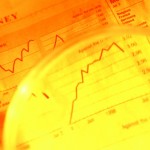 While equity ETFs have displayed some impressive form this year, they have certainly hit some rough patches in the last few years and perhaps may again in the near future. Having a sizeable fixed income ETF allocation is certainly a prudent way to minimize your risk exposure, especially if you have equities and bonds spread across various asset classes.
While equity ETFs have displayed some impressive form this year, they have certainly hit some rough patches in the last few years and perhaps may again in the near future. Having a sizeable fixed income ETF allocation is certainly a prudent way to minimize your risk exposure, especially if you have equities and bonds spread across various asset classes.
But for those looking to enhance diversification in their portfolios and don’t mind taking on a little additional risk, commodity ETFs are a viable option. As far as our model portfolios are concerned, we have some commodity ETFs. For instance, our Aggressive Portfolio contains PowerShares DB Commodity Index (DBC), which contains oil, gold, and metals holdings. Not to mention, our go-to mutual fund (PRPFX), includes gold and silver ETFs.
However, according to Warren Buffet’s sage advice, some of which he recently disseminated, investing in commodities such as physical gold or gold ETFs isn’t such a good idea. The Oracle of Omaha has a point about better long-term performance in equities, but if you’re looking to add minimal gold exposure in the short-term, it can help to serve as a hedge. Not to mention, the SPDR Gold Trust ETF has returned over 25% in the last 12 months.
Nevertheless, commodity ETFs do tend to exhibit more volatility. And there is also geopolitical risk associated with commodities as we’ve seen with countries cutting oil imports from Iran. Also, wavering Chinese demand for metals can have quite an impact on commodity prices on a global scale. Thus, gaining exposure to a basket of commodities through an ETF such as DBC is a preferable way of diversifying as opposed to choosing a specific commodity. For a list of some other diversified commodity ETFs, check out this list.
As seen by large drops in the performance of natural gas and agricultural commodity ETFs, it’s key to stay away from concentration risk by diving into only one or two commodities. Especially with various correlations between some commodities and other asset classes, it’s best to have a mix of different commodity ETFs.
For instance, take a look at a recent article on asset class correlations to get an idea of how oil and gold have behaved against the S&P 500. Historical trends and correlations can quickly break down, especially in these turbulent times with the European debt crisis. And commodities are no exception.
While I don’t have large client commodity ETF holdings, having some type of commodities allocation can be beneficial. If you have higher risk tolerance and want to complement your equity and bond ETF holdings, commodity ETFs can certainly reap rewards, especially during downturns if the correlation between commodities and equities becomes strongly negative.
Disclosure: Holdings in DBC
Contact Ulli